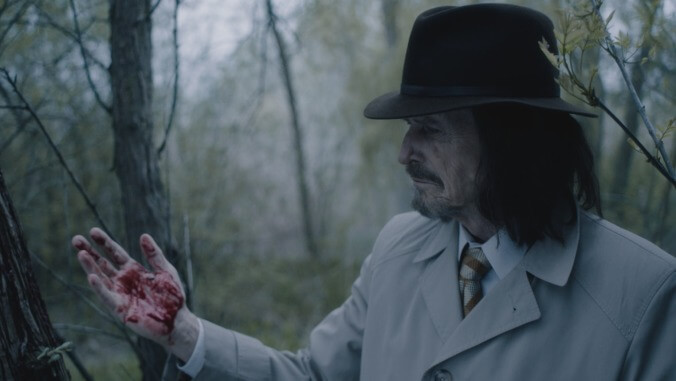So it goes for this story of a grizzled hitman (veteran character actor Stephen McHattie, reuniting with Pontypool director McDonald) who grows a late-life conscience after learning that his latest kills have allowed his boss, Hercules (Henry Rollins), to expand into the apparently lucrative child prostitution trade. Rollins—who gives a performance that could have been copied from any number of “crazy” crime boss characters over the years —plays just one of several oddballs standing in the way of McHattie’s efforts to turn himself into an older, more lackadaisical John Wick. The others include husband-and-wife pawn shop owners angling for each other’s deaths, a local depraved aristocrat (Juliette Lewis), and a trumpet player addicted to heroin who is also played, for no readily apparent reason, by veteran character actor Stephen McHattie.
If there’s a reason for this dual role, it never becomes especially clear—beyond giving the actor a chance to sing near the film’s climax and engage in a series of sporadic and meandering mumble-offs with himself. Dreamland occasionally feints at some sort of metaphysical connection between the two men, but then it feints at a whole bunch of things, never to much effect. McHattie’s performance as the nameless hitman does at least serve as the anchor that keeps the movie from flying fully off the rails, and the sight of him stalking through a crowd—a gaunt revenant clad in out-of-date fashions scavenged from the fall collection by Tom Waits—provides some of the film’s most striking shots.
Mostly, though, Dreamland just sleepwalks. McDonald tries to liven things up with some elaborate crosscutting and superfluous flashbacks, but the film draws most of its energy from two sources, neither of which end of up doing it any favors: a series of flamboyant minor characters and an ugly and recurring obsession with the sexual exploitation of children. The two come together in gruesome synthesis in the form of a character played by Tómas Lemarquis, a literal bloodsucker with a fashion sense pulled from a Murnau movie and red-rimmed eyes fixed firmly on his would-be child bride. Giggling and cheerfully malevolent, Lemarquis’ character feels like a refugee from another draft of the script, one where Dreamland was less mournful and solipsistic, and more boldly nihilistic in its attempts at dark comedy.
But if Dreamland has more on its mind than just perfunctory violence married to a run-of-the-mill redemption plot, then it both under- and over-plays its hand. McDonald all but shouts his subtexts at the audience, from the suited child soldiers who serve Rollins—the master of an underworld power base literally dubbed “Al-Qaeda”—up through scenes of global elites gathering to politely clap as a virginal child is fed to a simpering vampire. Those are big, hypothetically political swings from a movie that’s so otherwise simplistic that it draws the line between its good guys and its bad guys based entirely on whether they’re on board for selling children into sexual slavery. That ongoing obsession with pedophilia contributes to the film’s overwhelming scuzz factor, too; you can’t help but root for McHattie to kill Rollins et al. for their crimes against humanity, even as you feel repelled at the obvious manipulation of the subject matter.
In the end, Dreamland never bothers to decide whether it’s trying to be an elegiac, philosophical head trip or an over-the-top action thriller. (And if it wanted to be the latter, McDonald probably should have hired a better fight choreographer.) Most of its big-name stars behave as though they’re in a pitch-black comedy, while McHattie shuffles through the proceedings like a man damned, leaving a split at the movie’s core—one from which it never really recovers. The title suggests that Dreamland’s sleepy pacing and nonsensical plotting are meant to be a feature, not a bug. If so, it’s the sort of dream you’d be hard-pressed to remember once you’ve finally awoken from its grasp.


